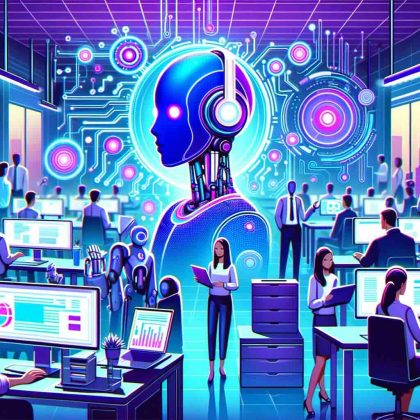The Rise of AI Ethics: What Data Scientists Need to Understand

Introduction
The Evolution of AI and Its Impact
Artificial Intelligence (AI) has come a long way since its inception. From the rudimentary algorithms of the 1950s to the sophisticated neural networks of today, AI has evolved into a force to be reckoned with. This rapid development has seen AI transition from mere academic interest to a transformative tool that permeates every facet of modern life. Whether it’s in healthcare diagnostics, financial predictions, or even our daily interactions with voice assistants, AI’s significance in today’s world is undeniable.
However, with great power comes great responsibility. As AI systems become increasingly integrated into our daily lives, their decisions hold more weight than ever before. This brings us to a crucial juncture in the AI journey: the need for ethical considerations.
The Need for Ethical Considerations
The influence of AI on decision-making is growing at an unprecedented rate. From determining loan eligibility to predicting criminal behavior, AI systems are making choices that have profound implications on individuals and societies. But what happens when these systems make a mistake? Or worse, when they operate with inherent biases?
Unchecked AI systems can lead to grave real-world consequences. There have been instances where biased algorithms have resulted in unfair treatment, leading to societal uproar and demands for accountability. Such incidents underscore the urgent need for ethical considerations in AI development and deployment.
Understanding the Core Principles of AI Ethics
Transparency and Explainability
At the heart of AI ethics lies the principle of transparency. For AI to be trusted, it must be transparent. But achieving transparency in AI is easier said than done, especially when we delve into the intricacies of machine learning models.
The Black Box Dilemma
One of the most significant challenges in AI ethics is the “Black Box” nature of certain algorithms. These algorithms, especially deep learning models, are often so complex that even their creators struggle to explain their decision-making processes. This opacity can lead to mistrust and skepticism, especially when an AI system’s decision has direct consequences on an individual’s life. If we can’t understand how a decision was made, how can we trust it?
Importance of Clear Documentation
To combat the Black Box dilemma, there’s a growing emphasis on clear documentation. By ensuring that AI systems are well-documented, developers can provide insights into how algorithms function and make decisions. This doesn’t just benefit the tech-savvy; clear documentation ensures that AI systems are understandable to both developers and the end-users they impact. By bridging this knowledge gap, we can foster trust and pave the way for more responsible AI integration in our societies.
Fairness and Bias
In the realm of Artificial Intelligence (AI), fairness isn’t just a virtue—it’s a necessity. As AI systems increasingly influence our lives, ensuring that they operate without bias becomes paramount.
Recognizing Inherent Biases in Data
Every AI system is only as good as the data it’s trained on. Unfortunately, many datasets carry the biases of the societies they originate from. Whether it’s racial, gender, or socio-economic biases, these prejudices can inadvertently find their way into AI systems, influencing their outcomes. For instance, a facial recognition system trained predominantly on one ethnic group might underperform or misidentify members of other ethnicities. Such biases not only undermine the reliability of AI but can also perpetuate societal inequalities.
Techniques to Mitigate Bias
Combatting bias in AI is a multi-faceted challenge. It begins with diverse and representative data collection. Data scientists must also employ techniques like algorithmic fairness interventions, which adjust algorithms to reduce bias. Tools like Fairness Indicators can help developers measure and improve fairness in their models. By adopting these methodologies, we can move closer to AI systems that ensure fairness and equity for all.
Accountability and Responsibility
As the adage goes, “With great power comes great responsibility.” This couldn’t be truer for AI. As AI’s influence grows, so does the need for accountability and responsibility in its deployment.
Assigning Blame in AI Failures
When an AI system falters, who is to blame? Is it the developers, the users, or the AI itself? This debate is at the forefront of AI ethics. While it’s easy to point fingers at the AI, it’s essential to remember that these systems are products of human design. Developers, companies, and even end-users all share a collective responsibility in ensuring that AI operates as intended.
The Role of Oversight and Regulation
To ensure accountability, external checks on AI systems are crucial. This is where oversight and regulation come into play. Regulatory bodies can set standards and guidelines for AI development, ensuring that systems are transparent, fair, and safe. By establishing a framework for AI ethics, we can foster trust and ensure that AI benefits society at large.
Privacy and Data Protection
In our data-driven world, privacy is a cornerstone of trust. As AI systems often rely on vast amounts of data, ensuring that this data is handled responsibly is crucial.
The Dangers of Data Misuse
Misuse of data isn’t just an ethical concern—it’s a tangible threat. From identity theft to financial fraud, mishandling user data can have dire consequences. Moreover, with AI’s ability to analyze and predict behavior, there’s a risk of personal data being used manipulatively, infringing on individual freedoms and rights.
Implementing Robust Data Security Measures
Protecting user data isn’t just about preventing external threats; it’s also about ensuring that data is used responsibly internally. This involves implementing robust data security measures, from encryption to access controls. Regular audits, data anonymization, and stringent data handling policies can further safeguard user data. By prioritizing data protection, we can ensure that AI operates with the user’s best interests at heart.
The Future of AI Ethics: Challenges and Opportunities
As we stand on the precipice of a new era, where Artificial Intelligence (AI) is set to redefine the very fabric of our society, the ethical implications of this technology cannot be overstated. The future of AI ethics is rife with challenges, but it also presents unparalleled opportunities for creating a just and equitable digital world.
The Ongoing Debate on AI Morality
The moral dimensions of AI are a topic of fervent debate among philosophers, ethicists, and technologists alike. At its core, the discussion revolves around the philosophical considerations of what it means for a machine to make decisions. Can a machine possess morality? If an AI system makes a decision that harms humans, is it the machine’s fault or the creators’? These philosophical quandaries have profound implications, especially as we inch closer to creating machines that might one day surpass human intelligence. Navigating this moral maze requires a deep understanding of both technology and human values.
Preparing Data Scientists for Ethical AI Development
The onus of ethical AI development doesn’t just lie with philosophers or ethicists; it’s squarely on the shoulders of data scientists and AI developers. As the architects of the AI future, it’s imperative that they are equipped with the tools and knowledge to build ethically sound systems. This underscores the importance of integrating ethics into AI education and training. Universities and training programs must prioritize ethical considerations, ensuring that the next generation of data scientists is not just technologically proficient but also morally conscious. By fostering an environment where ethics and technology go hand in hand, we can hope to create AI systems that benefit humanity as a whole.
The Role of Global Collaboration
AI is not bound by geographical borders. Its impact is global, and therefore, the approach to its ethics should also be global. International cooperation is paramount in shaping the future of ethical AI. By fostering a collaborative environment where countries, organizations, and individuals share knowledge, best practices, and resources, we can create a unified ethical framework for AI. Such collaboration can lead to standardized regulations, shared research, and a collective understanding of the moral implications of AI. In a world where technology is rapidly advancing, global collaboration ensures that no region is left behind in the ethical AI revolution.
Taking the Next Steps in Ethical AI Development
The journey towards ethical AI is a continuous one. As technology evolves, so will the ethical challenges it presents. It’s crucial for everyone, from data scientists to the general public, to stay informed and actively participate in discussions surrounding AI ethics. By engaging in these conversations, we can collectively shape the direction of AI development, ensuring that it aligns with human values.
Moreover, for those keen on delving deeper into this realm, numerous resources and courses offer insights into AI ethics. From online courses to workshops and seminars, there’s a wealth of knowledge waiting to be tapped. By arming oneself with this knowledge, one can actively contribute to the ethical AI discourse.
In conclusion, the rise of AI ethics is not just a technological challenge; it’s a human one. It’s about ensuring that as we stride forward into the AI era, we do so with caution, compassion, and a deep sense of responsibility. The future of AI ethics is in our hands, and it’s up to us to shape it.



